CENTER FOR THE NEUROBIOLOGY OF LEARNING AND MEMORY UNIVERSITY OF CALIFORNIA, IRVINE 2021

REPORT
With special thanks to the UCI Strategic Communications and Public Affairs team and the School of Biological Sciences Marketing and Communications Division.
Morgan Coburn is currently pursuing a PhD in neurobiology at the CNLM. Her research focuses on microglia, the brain’s immune cells, and how they are altered in neurodegenerative disease. She is co-chair of the CNLM’s flagship outreach program, the Brain Explorer Academy and co-leads the Center’s summer Brain Camp. Morgan proudly identifies as a Disabled Woman in STEM. As a Type 1 diabetic she advocates for affordable insulin through #Insulin4All and for other disabled students and scientists on campus.


CNLM Report 2
Meet our Cover Artist Editor Diana Lofflin Design and Production Alanna Regan Contributing Writers Rahasson Ager Heather Ashbach You (Lilian) Chen Steve Granger Diana Lofflin Maria Montchal Shani Murray Manuella Yassa Photography Angela Prvulovic Carlos Puma Steve Zyllius


Contents 4 6 8 18 28 30 38 44 50 52 3 Fall 2021 Meet the Team Director’s Message Feature Stories Breakthrough Research Grant Funding Celebrating CNLM Trainees The Next Generation of Neuroscientists Community Impact In Memoriam Building a Legacy Copyright © 2021 Center for the Neurobiology of Learning and Memory. Write to us at 320 Qureshey Research Lab, Irvine CA 92697-3800 Tel: 949-824-5193 | Web: cnlm.uci.edu | Email: memory@uci.edu
Center for the Neurobiology of Learning and Memory


Center Leadership
A. Yassa Director


Support Team

Barbara Dosher, Professor, Cognitive Science
Christine Gall, Professor and Chair, Anatomy and Neurobiology




Gary Lynch, Professor, Psychiatry and Human Behavior
Bruce McNaughton, Professor, Neurobiology and Behavior
Marcelo Wood, Professor and Chair, Neurobiology and Behavior
4 CNLM Report
Michael
Jennifer Smith Executive Director of Development
Sunil Gandhi Associate Director
London Perkins Numbers Ninja
Alanna Regan Virtuoso of Design
Executive Committee
Angela Prvulovic Ambassador of Buzz
Manuella Oliveira Yassa Director of Outreach and Education
Diana Lofflin Chief Administrative Officer
Alanna Regan Virtuoso of Design
Faculty Fellows
UCI Fellows External Fellows
Amal Alachkar
Javier Diaz Alonso
Pierre Baldi
Tallie Z. Baram
Lee Bardwell
Kevin Beier
Ruth Benca
Sven Bernecker
Mathew Blurton-Jones
Aaron Bornstein
Daniela Bota
Gregory Brewer
Jorge Busciglio
Susan Charles
Chuansheng Chen
Liz Chrastil
Lulu Chen
Susana Cohen-Cory
Karina Cramer
Steven Cramer
Barbara Dosher
Laura Ewell
Lisa Flanagan
Norbert Fortin
Christie Fowler
Ron Frostig
Christine Gall
Sunil Gandhi
Charles Glabe
Douglas Granger
Kim Green
John Guzowski
Elizabeth Head
Gregory Hickok
Robert Hunt
Kei Igarashi Autumn Ivy
Susanne Jaeggi
Claudia Kawas
Jeffrey Krichmar
Frank LaFerla
Julie Lauterborn
Michael Lee
Michael Leon
Frances Leslie
Stephen Mahler
Bryce Mander
Mark Mapstone
Elizabeth Martin
James McGaugh
Bruce McNaughton
Sara Mednick
Raju Metherate
Bin Nan Andrea Nicholas
Diane O’Dowd
Andre Obenaus
Sean Ostlund
Megan Peters
Daniele Piomelli
Jodi Quas
Uma Rao
David Reinkensmeyer
Jenna L Riis
Robert Spitale
Craig Stark
Oswald Steward
Mark Steyvers
Georg Striedter
Andrea Tenner
Julian Thayer
Leslie Thompson
Katherine Thompson-Peer
Kristina Uban
Theodorus van Erp
Craig Walsh
Momoko Watanabe
Marcelo Wood
Xiangmin Xu
Michael Yassa
Alyson K. Zalta
Ted Abel, University of Iowa
Ralph Adolphs, California Institute of Technology
Timothy Allen, Florida International University
Stephan Anagnostaras, UC San Diego
Ruth Benca, Wake Forest University
Michel Baudry, Western University
Francesco Battaglia, Radboud University
Federico B.Rattoni, UNAM, México
Kasia Bieszczad, Rutgers University
Jennifer Bizon, University of Florida
Tim Bredy, Univeristy of Queensland
Sara Burke, University of Florida
Robert Clark, UC San Diego
Laura Colgin, University of Texas at Austin
Michael Fanselow, UC Los Angeles
Joaquin Fuster, UC Los Angeles
Paul Gold, Syracuse University
Michael Hasselmo, Boston University
Alicia Izquierdo, UC Los Angeles
Barbara Knowlton, UC Los Angeles
Jill Leutgeb, UC San Diego
Stefan Leutgeb, UC San Diego
Kelsey Martin, UC Los Angeles
Aaron Mattfeld, Florida International University
Andrew Maurer, University of Florida
Mark Mayford, Scripps Institute
Richard Morris, University of Edinburgh
John O’Doherty, California Institute of Technology
Charan Ranganath, UC Davis
Benno Roozendaal, Radboud University
Barry Setlow, University of Florida
Alcino Silva, UC Los Angeles
Christine N. Smith, UC San Diego
Ivan Soltesz, Stanford University
Larry Squire, UC San Diego
Wendy Suzuki, New York University
Robert James Sutherland, University of Lethbridge
Brian Wiltgen, UC Davis
External Advisory Board
Carol Barnes, University of Arizona
Mark Bear, Massachusetts Institute of Technology
Jelena Radulovic, Northwestern University
Terry Sejnowski, Salk Institute for Biological Sciences
Linda Levine Mimi Liljeholm
Charles Limoli
Jack Lin
Elizabeth Loftus
Shahrdad Lotfipour
Angela Lukowski
Gyorgy Lur Gary Lynch
5 Fall 2021
1st Institute in the World Dedicated to the Study of Learning and Memory
DIRECTOR’S MESSAGE

Dear Friends,
I am humbled by the resilience, compassion, and dedication to excellence I have witnessed at the CNLM over the last two years as we experienced one of the most globally disruptive experiences of our lifetime –the COVID-19 pandemic.
The research coming from our labs continues to be of vital importance, but during this time I was reminded that the community we nurture and the students we inspire will create a lasting impact for years to come.
Two of those students — CNLM graduate students Angeline Dukes and Elena Dominguez— co-founded Black in Neuro, a grassroots global organization dedicated to empowering Black scholars and professionals in neuroscience-related fields.

Nikhita Kaushik, a high school student who participated in our 2019 Brain Camp, started the Southern California Youth Neuroscience Association (SCYNA), a CNLM-supported
Gender Diversity Among UCI

Fellows (Then and Now)
platform for high school students to learn, network, and grow as aspiring neuroscientists.

There are many more stories in this report that highlight the lasting impact of the investment we make in supporting our students and community. I am delighted to announce that we will be able to expand our support and our research even further as the CNLM was awarded the highly coveted UCI “Organized Research Unit” status in July of 2021.
This exciting milestone would not have been possible without the enthusiastic support of our faculty, staff, students, and community. Many wrote letters to campus administrators and spent countless hours putting together a proposal to showcase the outstanding research —and the global reach— of the Center.

I truly thank you for your efforts and support.
This is a reminder that we cannot do this alone. I am proud of our partnerships and grateful for the support of our Friends of the CNLM and the generosity of the Orange County philanthropic community.
The CNLM has been charting the global path of learning and memory discovery and research for thirty eight years. Our community of scholars is the largest and most diverse it has ever been. The quality and impact of their research has achieved new heights and sets the stage for a future filled with exciting possibilities.
I invite you to join us as we embark on this brilliant future together.
Michael A. Yassa, Ph.D.
6 CNLM Report
38 Years of Excellence in


7 Fall 2021
Discovery 58 CNLM trainees have received prestigious independent fellowships in 2019-2021 128 CNLM Fellows 90 UCI Fellows 38 External Fellows >$50,000,000 federal funding awarded each year on average for UCI Fellows >15,000 citations per Fellow on average
Feature Story
MEMORY: IT’S ABOUT TIME SPRING CONFERENCE

Originally conceived in 2020 but cancelled due to the COVID-19 pandemic, the 2021 conference was virtual and open to everyone.

The conference included more than 800 attendees from all around the globe.
The confernce featured the “Memory Mingle” to facilitate connections in the virtual format.

The mingle included breakout rooms where participants could take part in a discussion or play a game like pictionary (image left).

Open Paper and Data Blitz sessions allowed faculty and trainees to present their latest research.
Eight faculty presentations were featured in the Open Paper session and 31 trainee presentations were featured in the Data Blitz.
Dr. Lulu Chen was inspired by one of her favorite books, “The Little Prince” by Antoine de Saint-Exupéry: “It’s about time! It’s the time you spent on your [research] that makes your [research] so important.”

Organizing
- Lulu Chen
Committee Co-Chair
8 CNLM Report
much excellent research in the past several years has identified the dynamic nature of memory, both in how it changes over time and how it represents temporal content itself. We wanted to highlight this new dimension of memory research, and ask how it expands upon the well-grounded foundation of memory in the complementary dimensions of space.”

 - Aaron Bornstein
Organizing Committee Co-Chair
- Aaron Bornstein
Organizing Committee Co-Chair
SPEAKERS
Denise Cai
Mount Sinai Icahn School of Medicine
Sarah Dubrow
University of Oregon
Gabriel Elias
University of California, Irvine
Ben Gunn
University of California, Irvine Kari Hoffman
Vanderbilt University
Christopher Honey Johns Hopkins University
Kei Igarashi
University of California, Irvine
Sheena Josselyn Hospital for Sick Children
Jim Knierim
Johns Hopkins University
Sam McKenzie University of New Mexico
Arielle Tambini
University of California, Irvine
SPECIAL THANKS TO THE ORGANIZERS
Co-Chairs:
Aaron Bornstein Lulu Chen
Recalling a memory is a fundamentally reconstructive process, assembling multiple views of past experience to interpret the present and imagine the future.
Organizing Committee: Sunil Gandhi, Heechul Jun, Sarah Kark, Diana Lofflin, and Manuella Yassa
The three symposia for the 2021 Learning and Memory meeting featured the latest research findings supporting a dynamic, multi-scale understanding of memory.


FEATURED SYMPOSIA
1
Connections and Components investigated the ways in which neural circuits are “wired” to encode certain features of experience and what this means for how and what we remember.
Construction and Formation examined the fundamental building blocks of memories as they are encoded and reshaped by later experience.
Sequences and Structures discussed how memories are linked together to reflect the regularities of the world around us.
9 Fall 2021
“So
2 3
Feature Story
CNLM Earns University Designation as an Organized Research Unit
We are thrilled to announce that the University of California has approved the designation of the UC Irvine Center for the Neurobiology of Learning and Memory (CNLM) as an Organized Research Unit (ORU) in recognition of the CNLM’s critical role in supporting interdisciplinary research on the brain processes that enable the formation, maintenance and retrieval of memories.
From the day UCI first opened its doors, neuroscience has been among our towering academic strengths, including the establishment of the first department of neuroscience (at the time called Psychobiology) in the world in 1964 by Dr. James L. McGaugh. Subsequently, the CNLM was established in 1983 with Dr. McGaugh as its founding director.


CNLM Fellows work together to generate fundamental and often unexpected breakthroughs that have transformed our understanding of the workings of memory and the brain. Fellows are world-leading scholars providing both theoretical and empirical contributions to the neuroscience of learning and memory.
Read more at: https://cnlm.uci.edu/oru
10 CNLM Report
Over the last few years, the CNLM has launched several programs focused on training K-12 children in neuroscience and has become a national leader in this space. The Brain Explorer Academy, the UCI Summer Brain Camp, the Irvine Brain Bee and the Southern California Youth Neuroscience Academy all focus on teaching children not only the fundamentals of neuroscience but also critical thinking, research methods and analysis, science communication and leadership skills.




ORU designation is not only an official campus recognition of the value of the CNLM’s programs but also provides additional support to continue and expand these programs in the future.




11 Fall 2021
Building meaningful partnerships with the Orange County community continues to be a priority for the Center.
The Center is home to two public lecture series which have brought together over 70,000 Orange County community members to learn about memory and the brain.
“Since its inception, the CNLM has catalyzed and supported interdisciplinary research on the brain processes that enable the formation, maintenance, and retrieval of memory... I wish to congratulate all of our CNLM Fellows in attaining ORU status and to convey my best wishes for their continued success.”
- Pramod Khargonekar Vice Chancellor for Research
Feature Story
BLACK LIVES MATTER
The events of 2020 serve as a stark reminder that anti-Black racism is a fundamental issue that plagues our society and reminds us that our work to foster inclusion is far from done.
The senseless murders of George Floyd, Breonna Taylor, Tony McDade, Ahmaud Arbery, and so many others remind us that we still have a long way to go to ensure that our society ceases to dehumanize and abuse Black people.
We must recognize how our own actions contribute to the culture that allows unforgivable police brutality to persist. In the academic environment, implicit bias and microaggressions, and even explicit racism, remain rampant and consequential, contributing to the low recruitment and retention of Black scientists.

Not talking about these challenges because it makes us uncomfortable is no longer an option. We can do better. We must do better.
This is a pivotal moment in our history, a moment of reckoning in which we, as a nation, can choose to say, “enough is enough.” A moment upon which we can look back decades from now and be proud of the actions we have taken against racism. A moment in which we can stand in solidarity with the Black community, united in the fight for equality. A moment when the words “Black Lives Matter” can transform from a message of struggle to become a beacon of hope. We have to choose to forge this future and denounce the unconscionable alternative.
We have a long and arduous road ahead to accomplish our goal of racial justice and equality. But we are committed to staying the course.
- Michael A. Yassa Director
Committed to Action
Over the last year the CNLM has:
Increased seminar speaker diversity
Increased diversity among faculty Fellows
Launched a new UC-HBCU summer research program
Hosted workshops and town halls on systemic racism

Supported the Black in Neuro movement
“Times of challenge and controversy may divide us, but our actions and moral resolve can bring us together as one. I hope that when we look back on this moment, we can say that we were on the right side of history. I hope we can say we made a difference.”
- Michael Yassa Director
#BlackLivesMatter
12 CNLM Report 1 2 3 4
5
#BlackinNeuro. The CNLM served as an incubator that provided an early home for the #BlackinNeuro movement, which now includes more than 22,000 followers on Twitter and has evolved into an independent nonprofit organization.



Find out more at @BlackInNeuro

#BlackinNeuro
CNLM student Angeline Dukes’ drive to recognize and highlight Black Excellence in the field of neuroscience is gaining wide recognition. https://cnlm.uci.edu/blackinneuro


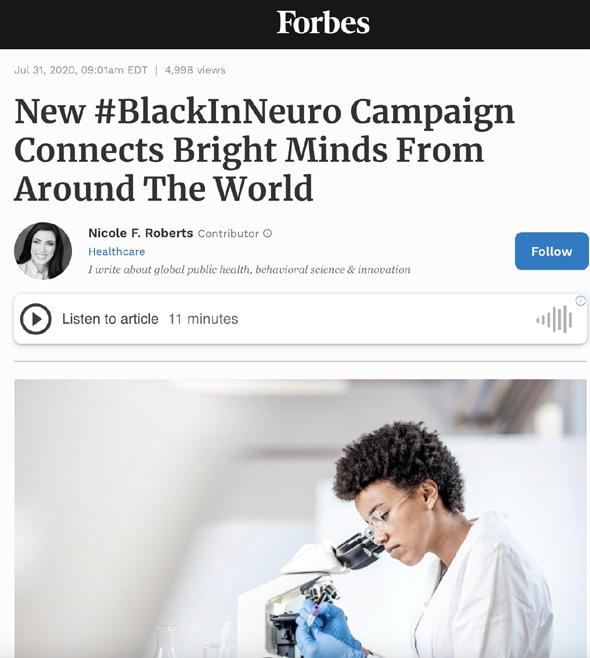

Black in Neuro’s mission is to diversify the neurosciences by building a community that celebrates and empowers Black scholars and professionals in neuroscience-related fields.
Learn More at: https://www.blackinneuro.com
CNLM Awarded NSF REU Grant for Summer Institute in Neuroscience

We are excited to announce that the CNLM was awarded federal funding to develop the Irvine Summer Institute in Neuroscience, a Research Experiences for Undergraduates (REU) program.

Funding for this program comes from the National Science Foundation’s Research Experiences for Undergraduates (REU) program and the Department of Defense’s Awards to Stimulate and Support Undergraduate Research Experiences (ASSURE) program. Both of these competitive and prestigious programs aim to attract and retain a diverse pool of junior scientists to careers in science.

The program launched in the summer of 2021 with ten undergraduate students from around the country who virtually joined UCI to experience life as a neuroscientist for eight weeks.
Admitted students conduct research under the mentorship of CNLM faculty. In addition to conducting research, they engage in workshops as well as professional development and
networking activities that prepare them for graduate school and careers in neuroscience.
“Immersion in research and the research environment is invaluable in shaping the passion and drive for discovery that are necessary for a career as a scientist,” said Manuella Oliveira Yassa, Director of Outreach and Education at the UCI CNLM and co-director of the program.
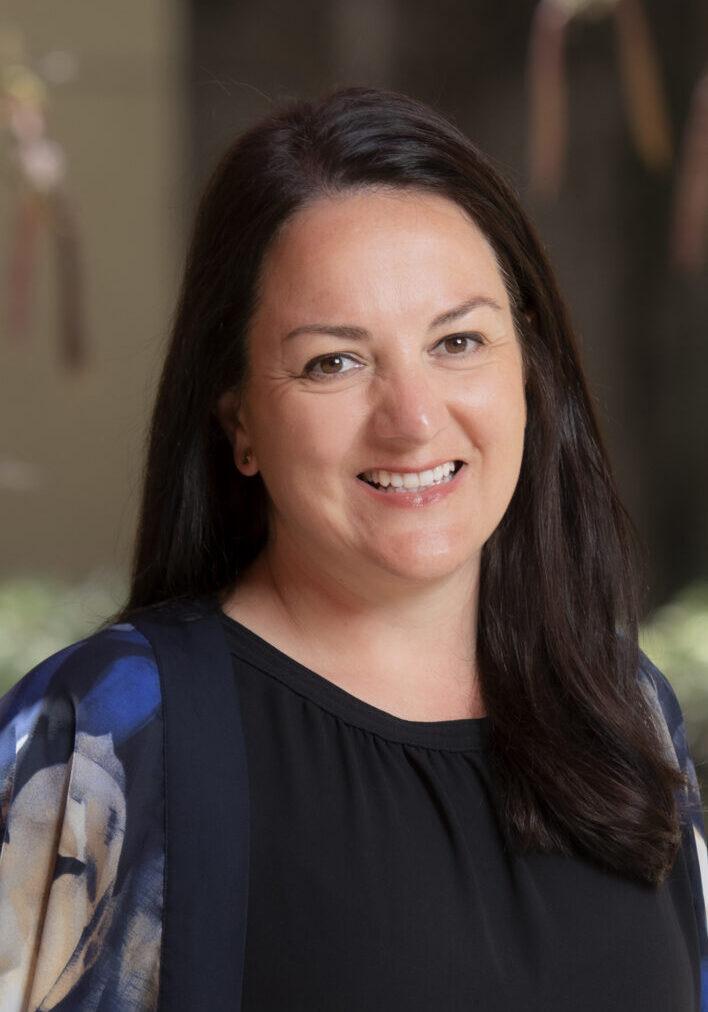
The program will leverage the strengths of the close-knit community of students in the CNLM Ambassador program who are the heart and soul of the
CNLM. The Ambassadors learn, grow and serve together and are instrumental in creating the inclusive, collaborative, supportive and engaging environment where students of all backgrounds will succeed.
“This experience will help students gauge what really drives them as they seek graduate studies and what skills they need to strengthen so they can thrive in graduate school,” said Luis ColonPerez, assistant researcher in the department of Neurobiology and Behavior and co-director of the program.
To learn more about the program please visit: https://cnlm.uci.edu/reu

14 CNLM Report
Feature Story
Thank you to our sponsors
Luis Colon-Perez REU Principal Investigator
Manuella Oliveira Yassa REU Principal Investigator
“The CNLM’s Summer Institute in Neuroscience provides a robust structure for training high-achieving students from diverse backgrounds, and we are excited to bring in students from Delaware State University. By placing HBCU students in faculty labs that value diversity and culturally-aware mentorship, UCI will facilitate a high-caliber research and mentorship experience for these students to explore careers in neuroscience.”
Principal Investigator, UC-HBCU program

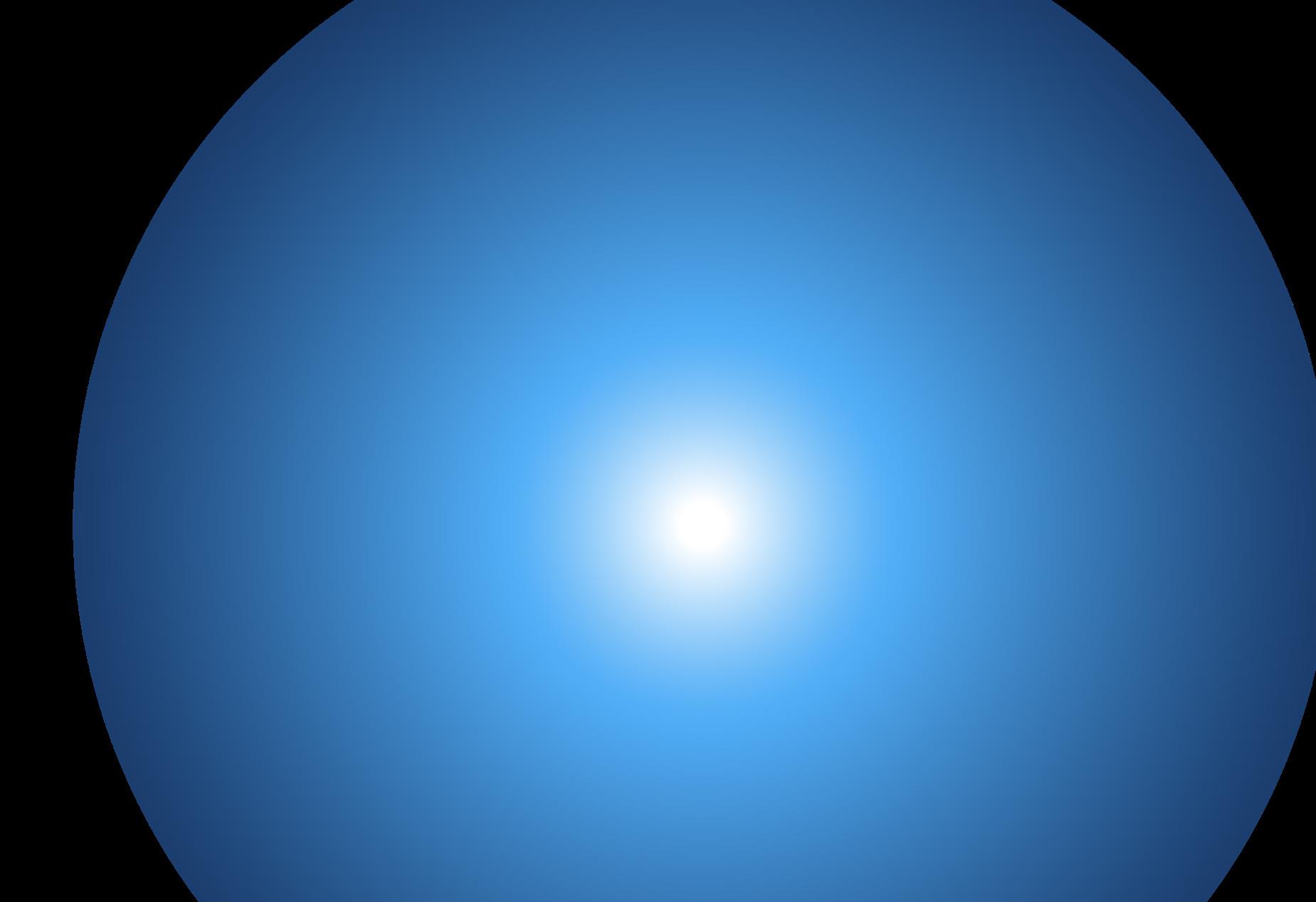
CNLM Partners with HBCUs to Create Pathways to Graduate School
The CNLM was awarded a UC-HBCU Initiative Summer Research and Graduate Admissions Pathways Grant from the UC Office of the President to sponsor a partnership with Delaware State University, one of 107 Historically Black Colleges and Universities in the U.S.
The program, led by Autumn Ivy and Manuella Yassa, will support 30 students from HBCUs to participate in the Summer Institute in Neuroscience (see left) over three summers. The residential program includes research training and professional development as well as year-round scientific and professional development
activities, including a joint virtual seminar series. HBCU students will reside on campus for 8 weeks each summer and will conduct cutting-edge research in CNLM laboratories and will present their research to the scientific community during the CNLM’s
annual learning and memory conference. The CNLM’s UC-HBCU partnership was one of only seven University of California proposals awarded funding and the only one awarded to UC Irvine in 2021.
Read more at: https://cnlm.uci.edu/uc-hbcu
Autumn Ivy UC-HBCU Principal Investigator

15 Fall 2021
-Autumn Ivy
“In broadening pathways to graduate education in neuroscience, the Summer Institute will contribute to transforming the professoriate and knowledge workforce of the future.”
- Douglas Haynes Vice Chancellor for Diversity, Equity and Inclusion
Feature Story
Summer Institute in Neuroscience Class of 2021





During the summer of 2021, the CNLM’s Irvine Summer Institute in Neuroscience hosted 10 undergraduate students from around the country to conduct research in CNLM labs. In addition to completing their own research projects, the students engaged in scientific and professional development workshops, seminars, journal clubs, and more.
University of California, Riverside
“My work in the lab has involved developing a robust method of generating models of brain networks that reduce technical biases known in several publicly available algorithms.”

University of Texas, Austin
“Throughout my time in the REU, I’ve worked alongside Anthony Raus, a graduate student in Dr. Autumn Ivy’s lab, to identify genes regulated by early-life exercise using RNA sequencing. Identification of these genes may aid in better understanding the long-term effects of early-life exercise on cognitive function.”

Claflin University
“As an intern in Dr. Mahler’s lab, my research involves studying the effects of early life adversity on how the brain responds to opioid withdrawal, utilizing an atlas for the rat brain to delineate anatomical structures and count the number of cells activated during withdrawal in various parts of the brain that are important for signaling the aversive, or stressful, parts of withdrawal.”

you to our sponsors
To learn more about the program please visit https://cnlm.uci.edu/reu
16 CNLM Report
Thank
University of Michigan
“Over the summer I assisted in improving a new version of UC Matrix Reasoning Test (UCMRT) by running participants through our task and then using the data collected to validate it and identify any problematic questions. Eventually, we will use this data to develop a version of UCMRT that can be used to measure visuospatial working memory in children.”
“Over the summer, I worked in Dr. Christie Fowler’s lab, which studies the underlying mechanisms of drug addiction and associated behavioral changes utilizing rodent models.”



“Over the summer, I worked with Dr. Michael Yassa where I helped with the development and testing of a new screening tool for Highly Superior Autobiographical Memory (HSAM), a rare condition marked by exceptional recall of autobiographical events.”
“My role in Dr. Gandhi’s lab has primarily involved extensive literature review of various candidates- transcripts which are significantly expressed in adult mouse visual cortex post-transplantation and may underlie the reactivation of plasticity.”







“I am contributing to research in the Tambini lab by designing, running, and analyzing an online experiment that examines how distinct awake brain states support consolidation after learning, and how consolidation mechanisms interact across brain states.”
“I am currently working at Dr. Chrastil’s lab where we focus on spatial neuroscience. We study spatial memory and human path integration all through the creation of virtual reality environments and fMRI imaging.”




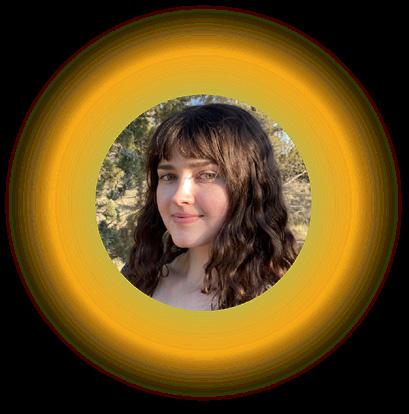

“ I am investigating adolescent vulnerability to relapse of nicotine addiction. Using behavioral science, we apply a reinstatement model of drug relapse and collect data to analyze sex differences and significant sensitivity to nicotine.”
Read more at: https://cnlm.uci.edu/2021reu/
17 Fall 2021
Michael Hicks
Jordan Sigler
Penn State University
Wellesley College
University of Puerto Rico
Williams College
Northeastern University
Breakthrough Research
 - Maria Montchal Lead Study Author
- Maria Montchal Lead Study Author


Research Shows a New Way the Brain Marks Time
Research Shows a New Way the Brain Marks Time
With a little help from HBO’s “Curb Your Enthusiasm,” CNLM neuroscientists have uncovered a key component of how the human brain marks time.

New research from the lab of Dr. Michael Yassa, professor of neurobiology and behavior and Director of the CNLM has identified a new network of brain regions that store information related to when events happen. The study was published in the journal Nature Neuroscience.
“The field of neuroscience has focused extensively on understanding how we encode and store information about space, but time has always been a mystery,” said Yassa.
The group demonstrated that the lateral entorhinal cortex plays a prominent role in temporal processing in a task where participants are asked to view clips from HBO’s Curb Your Enthusiasm inside the MRI scanner and answer questions related to when events happen in the clip.

These findings are also consistent with results in rodents from the laborarory of Edvard and May-Britt Moser who were awarded the 2014 Nobel Prize in Physiology or
Medicine. Their work suggests that the lateral entorhinal cortex integrates time over the course of an experience.
Most studies examining time in the laboratory employ static objects on a computer screen, but they tell very little about how the brain processes information in the real world. This is why this study used “Curb Your Enthusiasm,” a situational comedy that mirrors real life, as it involves people, scenes, dialogue, humor and narrative.
Find out more: https://cnlm.uci.edu/time-memory
19 Fall 2021
“Space and time have always been intricately linked, and the common wisdom in our field was that the mechanisms involved in one probably supported the other as well, but our results suggest otherwise.”
Breakthrough Research
Online Brain Games Show Learning Ability in One Area Can Predict Performance in Another
Brain-based skills like problem solving and language abilities may not seem to go hand in hand, but a new study led by CNLM Fellow Mark Steyvers says aptitude in one can forecast performance in the other. Findings, published in the journal Nature Human Behaviour, suggest a person’s general learning ability may be constant across a variety of tasks.
For the study, Steyvers partnered with
Robert Schafer of Lumosity, an online brain training platform. They analyzed performance data of more than 36,000 participants, ages 18 to 90, spanning 51 games that targeted different cognitive skills. The researchers found that good performance in one area could predict success in a game with a completely different cognitive emphasis.
“Collaboration with Lumos Labs has enabled me to access the right data, without fear of compromising individual privacy,” says Steyvers. “Industry partnerships enable researchers to access large-scale data sets that enable more extensive and precise investigations of human learning than is typically achievable conducting tests in a laboratory.”

Find out more: https://cnlm.uci.edu/brain-games/
multiple cognitive tasks like memory, attention, reasoning and problem solving, and whether improvement in one task related to improvement in another. We found that not only did improvement in one task relate to improvement in another; it could also be used to predict it.”

“We
- Mark Steyvers Professor of Cognitive Science
20 CNLM Report
were interested in learning how people train across
findings indicate amblyopia treatment may need to be revised, the traditional treatment of patching the good eye may need to be supplemented with newer methods such as binocular training, to preserve and improve three-dimensional vision as much as possible.”
 - Carey Huh Lead Study Author
- Carey Huh Lead Study Author
Putting the ‘Lazy Eye’ to Work
When CNLM postdoctoral scholar Carey Y.L. Huh, Ph.D. set her sights on discovering more about amblyopia, she brought personal insight to her quest. As a child, Huh was diagnosed with the condition, which is often called “lazy eye.”
Huh is a researcher in the lab of CNLM Fellow Sunil Gandhi. She and her colleagues have found that amblyopia originates in an earlier stage of the visual pathway than was previously thought. Their research, published in The Journal of Neuroscience, raises the possibility of new treatment approaches.

For those with amblyopia, vision in one eye is much poorer than the other, interfering with how their brains and eyes work together to produce what they see. One of amblyopia’s hallmarks is difficulty with threedimension perception, which necessitates use of both eyes.
Traditionally, scientists have thought amblyopia starts in the brain’s visual cortex. Using two-photon calcium imaging, an advanced technique that displays cerebral activity in real time, Huh and her colleagues revealed that amblyopia’s impact on binocular vision actually originates in the thalamus, which serves as the information relay station between the eyes and the visual cortex.
Many of the estimated two to five percent of people globally with amblyopia lack the ability known as binocular vision. Amblyopia begins in childhood and accounts for most visits by youngsters to vision professionals.
Find out more: https://cnlm.uci.edu/lazy-eye/
“Our
21 Fall 2021
Breakthrough Research Chasing the Memory Not the High
Addiction to drugs and alcohol is a problem that affects millions of Americans - yet one for which treatment has advanced very little for decades.

In an article published in the journal Neuropsychopharmacology, Bornstein and co-author Hanna Pickard, Bloomberg Distinguished Professor of philosophy and bioethics at Johns Hopkins University, present a novel theory that focuses on memory, not compulsion, as the driving factor behind addictive behavior.
This idea could explain why people keep using drugs despite having repeated negative experiences. It might also explain how people can relapse, even after years without using. Put another way, the drug may have disappeared
Find out more: https://cnlm.uci.edu/memory-high

from their lives, but the memories always remain. This new model suggests that treatment for addiction may need to focus on strengthening existing and creating new associations between drug cues and drug-inconsistent rewards, rather than breaking learned associations between drug cues and drug rewards - which is a common goal of many other treatments under development today.
“A recovering addict may know the consequences of using again, but something as seemingly innocuous as a social cue—like seeing a friend they’ve used with in the past—can bring back those past experiences, and might be enough to cause a relapse, despite the consequences.”
- Aaron Bornstein Assistant Professor of Cognitive Sciences

22 CNLM Report
CNLM Fellow Aaron Bornstein believes episodic memory, more than compulsive behavior, could be to blame for relapses among those addicted to drugs or alcohol
-
Distinguished Professor of Psychological Science
Fake News Can Lead to False Memories

New study suggests voters may recall fabricated stories at the voting booth

Voters may form false memories after seeing fabricated news stories, especially if those stories align with their political beliefs.
CNLM Fellows Elizabeth F. Loftus and Linda J. Levine, doctoral candidate Rebecca Hofstein Grady, in collaboration with Gillian Murphy at University College Cork and Ciara M. Green at University College Dublin, recruited 3,140 eligible Irish voters online and asked them whether and how they planned to vote in the upcoming 2018 referendum on legalizing abortion in Ireland.
Next, the researchers presented each participant with six news reports, two of which were made-up stories that depicted campaigners on either side of the issue engaging in illegal or inflammatory behavior.
Nearly half of the respondents reported a memory for at least one of the made-up events; many of them recalled rich details about a fabricated news story. The individuals in favor of legalizing abortion were more likely to remember a falsehood about the referendum opponents; those against legalization were more likely to remember a falsehood about the proponents.
The researchers say they plan to expand on this study by investigating the influence of false memories related to the Brexit referendum and the #MeToo movement.
Find out more: https://cnlm.uci.edu/fake-news/
Loftus says understanding the psychological effects of fake news is critical given that sophisticated technology is making it easier to create not only phony news reports and images, but fake video, as well.


23 Fall 2021
“People will act on their fake memories, and it is often hard to convince them that fake news is fake. With the growing ability to make news incredibly convincing, how are we going to help people avoid being misled?”
Elizabeth F. Loftus
Breakthrough Research Deep Learning Algorithm Solves Rubik’s Cube Faster Than Any Human

Find out more: https://cnlm.uci.edu/rubik
Since its invention by a Hungarian architect in 1974, the Rubik’s Cube has furrowed the brows of many who have tried to solve it, but the 3D logic puzzle is no match for an artificial intelligence system created by the lab of CNLM Fellow Pierre Baldi,
a Distinguished Professor of Computer Science.

The study, published in the journal Nature Machine Intelligence, describes Baldi’s DeepCubeA, which can find the solution in a fraction of a second, without any specific domain knowledge or in-game coaching from humans. This is no simple task considering that

the cube has completion paths numbering in the billions!
The fastest people need about 50 moves to solve a Rubik’s Cube. “Our AI takes about 20 moves, most of the time solving it in the minimum number of steps,” says Baldi. “My best guess is that the AI’s form of reasoning is completely different from a human’s.”
Outlining the foundations of artificial intelligence using first principles, Pierre Baldi’s latest book reveals the connections between deep learning and neuroscience, explores applications in the natural sciences, and sets the record straight on fact versus fads in AI.

24 CNLM Report
“People who are taking these drugs to perform better in school or at work may feel as though they are doing better, but our data don’t support this feeling.”
- Sara Mednick Professor of Cognitive Sciences

Drugs Taken to Improve Cognition Only Boost Short-term Focus – at High Cost
Nonprescribed psychostimulants impair sleep and working memory.
The use of prescription stimulants by those without medically diagnosed conditions marks a growing trend among young adults –particularly college students seeking a brain boost. But according to a study led by CNLM Fellow Sara Mednick, professor of cognitive sciences and director of the campus’s Sleep and Cognition Lab, taking a non-prescribed psychostimulant may slightly improve a person’s short-term focus but impede sleep and mental functions that rely on it – such as working memory.

Twenty-four hours after ingestion, the group receiving the stimulant did markedly worse on a working memory test than did the placebo group, and overnight EEG and polysomnography measurements showed significant reductions in total sleep time and quality for those given the stimulant.
“Our research suggests that the purported enhancement to executive function from psychostimulants in healthy populations may be somewhat exaggerated, as we found only
minor daytime improvement in attention and no benefit to working memory,” said Mednick.
“Healthy individuals who use psychostimulants for cognitive enhancement may incur unintended costs to cognitive processes that depend on good sleep,” said lead author Lauren Whitehurst, Mednick’s former graduate student who’s now a postdoctoral fellow at UCSF. “Our research shows that while psychostimulants may mildly curb natural attentional deterioration across the day, their use also disturbs sleep and post-sleep executive function.”
Find out more: https://cnlm.uci.edu/psychostimulants/
25 Fall 2021
Breakthrough Research
New Research “Sniffs Out” How Associative Memories are Formed
Has the scent of freshly baked chocolate chip cookies ever taken you back to afternoons at your grandmother’s house? Has an old song ever brought back memories of a first date? The ability to remember relationships between unrelated items (an odor and a location, a song and an event) is known as associative memory.
In a new study reported in the journal Nature, CNLM Fellow Kei Igarashi, assistant professor of anatomy and neurobiology, along with PhD students Heechul Jun and Jason lee, have discovered that specific neurons called “fan cells” within the entorhinal cortex of the brain are responsible for acquiring new associative memories.
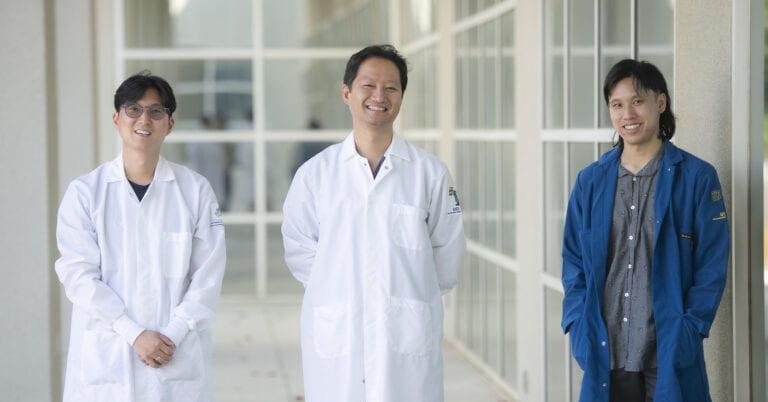
The team also discovered that these associative memory neurons are controlled by
dopamine, a brain chemical traditionally associated with pleasurable experience.
This discovery is an important piece in the puzzle of understanding how memories are formed in the brain and lays a foundation on which other researchers can continue to build. Associative
memory abilities are known to decline in neurodegenerative diseases like Alzheimer’s Disease. Understanding the neurobiological mechanism of how these memories are formed is the first step to developing therapeutics to slow the loss of associative memory abilities in Alzheimer’s disease.
Find out more: https://cnlm.uci.edu/Igarashi-Lab
“We never expected that dopamine is involved in the memory circuit. However, when the evidence accumulated, it gradually became clear that dopamine is involved. These experiments were like a detective story for us, and we are excited about the results.”
- Kei Igarashi Assistant Professor of Anatomy and Neurobiology
26 CNLM Report
UCI team is first to discover how the brain creates memories of delicious smells.
- Steve Mahler
Associate Professor of Neurobiology and Behavior

Cannabis More Potently Impacts the Brains of Adolescent Females than Adolescent Males
According to a new study published in the Journal Neuropsychopharmacology, the main psychotropic component of cannabis, Δ9tetrahydrocannabinol (THC), is differentially processed by the bodies of adolescent female and male rats.
The study was led by CNLM Fellow Steve Mahler, associate professor of neurobiology and behavior. The team’s findings offer new insights into the sex-dependent manner in which THC impacts the adolescent brain. The use of cannabis in teens and young adults has prompted study into THC’s effects on the brain by
many investigators, including Professor Mahler’s team.
Mahler and his team utilized a rat model to investigate THC effects in adolescents of both sexes. They examined THC metabolism and distribution in the brain and blood, and characterized its effects on behavior and activity of brain reward and stress neural networks.
The team found marked sex differences in THC metabolism, including a female-specific elevation in a THC bioactive metabolite called 11-OHTHC, which confirmed prior suggestions from human and
animal studies. Additionally, they observed dose-dependent and sex-dependent effects on behavior and neural activity within the brain’s reward and stress networks. These findings may help explain why THC effects differ based on sex, and suggest that the drug may have distinct effects on brain development in adolescent boys and girls.
Dr. Mahler’s team recently confirmed and expanded on these results using aerosolized “vaped” THC in adolescent male and female rats. Vaping of marijuana has nearly doubled among high schoolers in recent years according to the NIH.
27 Fall 2021
“Given recent changes in laws regulating cannabis in the US, and mounting evidence suggesting that exposure to cannabinoid drugs during adolescent brain development can cause permanent changes in brain circuits, we have begun to examine long-lasting changes in brain reward circuits and behavior.”
Find out more: https://cnlm.uci.edu/Mahler-Adolescent-Cannabis
Grant Funding
Baram, a child neurologist, was awarded $15 million by the National Institute on Mental Health to renew the Conte Center at UCI, allowing her interdisciplinary team to continue studying how unpredictable parental and environmental signals influence vulnerability later in life to cognitive and emotional problems, such as risky behaviors, addiction and post-traumatic stress disorder.
Baram was also the lead researcher for a $2.3 million California Initiative to Advance Precision Medicine grant to address the health impacts of adverse childhood experiences using precision medicine.
http://contecenter.uci.edu

Bornstein received a Brain & Behavior Research Foundation Young Investigators Grant to investigate relapse in substance abuse.


He proposes that memories of early drug experiences end up driving the decision to seek drugs, even after years of sobriety.
A shift toward understanding addiction as a memory disorder would dramatically expand the range of treatment options available.
Jaeggi received a National Institute on Aging grant to study interventions that may ultimately contribute to reducing cognitive decline in older adult populations.

The study will investigate whether individual differences in how well someone can deal with distracting information may explain some of the various results observed in the literature in terms of working memory training outcome.
Susanne Jaeggi is part of a nationwide project aiming to recruit 30,000 volunteers to uncover what cognitive interventions might work best for whom, a project that is open for participation to all. Start Playing Games: https://cnlm.uci.edu/brain-game
28 CNLM Report
Involved!
Tallie Z. Baram, M.D., Ph.D. Aaron Bornstein, Ph.D. Susanne Jaeggi, Ph.D.
Get
From Innovation to Discovery
Wood and Lynch received a grant from the National Institute on Drug Abuse to examine epigenetic mechanisms in the brain governing drug-seeking behavior.



Their team has identified a small population of neurons in an area of the brain’s reward pathway that previously received little attention in relapse behavior research. With this grant, the team will open a new door to understanding the molecular and cellular mechanisms of drug relapse and potentially identify novel therapeutic targets for drug
Head and Mapstone, along with researchers from around the world, were awarded a $100 million NIH grant to examine biomarkers for Alzheimer’s disease in adults with Down syndrome.

Down syndrome is the most common neurodevelopmental disorder affecting over 250,000 individuals in the United States. People with Down syndrome have a very high risk of developing Alzheimer’s disease and nearly all have the brain pathology (amyloid plaques) of Alzheimer’s at death.
Read more about ABC-DS Study at https://www.nia.nih.gov/research/abc-ds
Diaz Alonso was awarded a 2021 Brain & Behavior Research Foundation Young Investigator Grant to support his research on synaptic plasticity. The grant will allow Diaz Alonso‘s team to focus on one neurotransmitter receptor which is crucial to many forms of synaptic plasticity, called the AMPA receptor. Specifically, they will test the possible connection between AMPA receptor dysfunction and some of the molecular, cellular, and behavioral alterations found in schizophrenia.

29 Fall 2021
Elizabeth Head, Ph.D. & Mark Mapstone, Ph.D.
Marcelo Wood, Ph.D. & Gary Lynch, Ph.D.
Javier Diaz Alonso, Ph.D.
Celebrating CNLM Trainees

CNLM Ambassador Program: Neuroscience for Orange County













CNLM scientists are driven in the laboratory and engaged in the community, designing and implementing opportunities for meaningful and active participation in science. Launched in 2017 by CNLM Director of Outreach and Education Manuella Oliveira Yassa, the program aims to advance public understanding of brain science through outreach and community education activities. Now nearly 100 Ambassadors strong, the program reaches thousands of Orange County children and adults each year.

https://cnlm.uci.edu/ambassadors/

 Desiree Macchia K-12 Committee Co-Chair
Jonathan Hasselmann Brain Explorer Academy Co-Chair
Hamsi Radhakrishnan K-12 Committee Co-Chair Miranda Chappel-Farley Adult Program Co-Chair
Steve Granger Communications Committee Co-Chair
Caden Henningfield Brain Bee Co-Chair
Manuella Oliveira Yassa Program Director
Lily Cheng Adult Program Co-Chair
Aby Flores Communications Committee Co-Chair
Andra Ionescu Professional Development Chair
Jessica Noche Lingad Program Co-Chair
Morgan Coburn Brain Explorer Academy Co-Chair
Rachael Hokenson Brain Bee Co-Chair
Keiland Cooper Outcomes Committee Co-Chair
Olivia Bernstein Outcomes Committee Co-Chair
Desiree Macchia K-12 Committee Co-Chair
Jonathan Hasselmann Brain Explorer Academy Co-Chair
Hamsi Radhakrishnan K-12 Committee Co-Chair Miranda Chappel-Farley Adult Program Co-Chair
Steve Granger Communications Committee Co-Chair
Caden Henningfield Brain Bee Co-Chair
Manuella Oliveira Yassa Program Director
Lily Cheng Adult Program Co-Chair
Aby Flores Communications Committee Co-Chair
Andra Ionescu Professional Development Chair
Jessica Noche Lingad Program Co-Chair
Morgan Coburn Brain Explorer Academy Co-Chair
Rachael Hokenson Brain Bee Co-Chair
Keiland Cooper Outcomes Committee Co-Chair
Olivia Bernstein Outcomes Committee Co-Chair
31 Fall 2021
Natalie DiProspero Program Co-Chair
“The
dedication and commitment of the CNLM Ambassadors to the Orange County community
is
truly exemplary. Their resilience and creativity led them to create virtual programs that enabled children and adults in our community to engage with scientists from the safety of their own homes during the COVID-19 pandemic and provided valuable enrichment opportunities. The actions of the CNLM Ambassadors define what it means to be an engaged scientist.”
- Manuella Oliveira Yassa Program Director, CNLM Ambassador Program
Celebrating CNLM Trainees
NeuroScholars support one another in shift to remote learning



For many students, navigating the complex upper-division undergraduate research and mentorship opportunities at UCI can feel like a daunting task. In 2020, this task was intensified by the shift to virtual learning and the social distancing required to curb the spread of COVID-19. Despite these challenges, a group of dedicated undergraduates, the NeuroScholars, found ways to support one another and build community around their shared passion for understanding the brain.
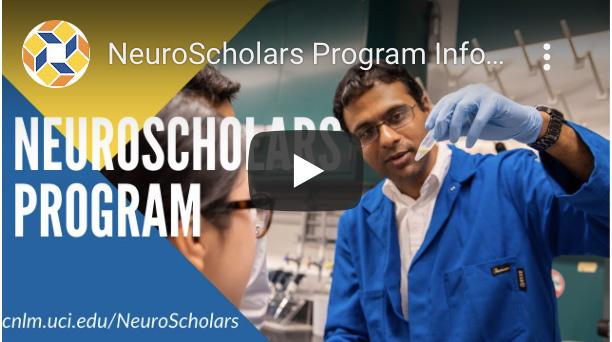
Find

“The program really pivoted last year as it previously relied on the lab course and hands-on experiences which were not possible during the pandemic. We welcomed a second cohort because at unprecedented times like these, communities are even more valuable. It has been incredible to watch the incoming NeuroScholars build this virtual community.”
- Manuella Oliveira Yassa Director of Outreach and Education
32 CNLM Report
out more: https://cnlm.uci.edu/neuroscholars-support
“The Howard Schneiderman Interdisciplinary Training Program is a prestigious and highly selective program that recognizes some of the CNLM’s top scholars. Our goal is to train tomorrow’s top leaders in neuroscience.”



T32 Program
Howard Schneiderman T32 Training Program
The Howard Schneiderman Interdisciplinary Training Program in Learning and Memory at the Center for the Neurobiology of Learning and Memory is a NIMH funded T32 predoctoral training program that is supplemented with a private endowment named in honor of Howard Schneiderman (1927-1990), former Dean of Biological Sciences at UC Irvine and a major driving force in building the School in its early days.
Schneiderman Fellows



The training program is directed by Drs.
The Schneiderman Training Program is an immersive experience in learning and memory and is a major undertaking by trainees. All trainees successfully complete advanced coursework, participate in professional development activities, and present their research at the CNLM annual conference.
Granger 2020/2021, 2021/2022
Rachael

2020/2021, 2021/2022

Aliza Le 2019/2020, 2020/2021
https://cnlm.uci.edu/t32
- Michael A. Yassa Co-Director, Schneiderman
Miranda Chappel-Farley 2020/2021
Steve
Hokenson
Carlene Chinn 2021/2022
Elena Dominguez 2020/2021, 2021/2022
Vinicius Duarte 2021/2022
Sophia Levis 2019/2020
33 Fall 2021
Michael Yassa and Bruce McNaughton.
Celebrating CNLM Trainees Junior Scholars Awards 2020-2021
This award recognizes students who excel in both scholarship and research, and to support the students in completing research in their senior year.












This award is supported by the CNLM Director’s Excellence Fund and recognizes outstanding trainees for their extraordinary achievement in research, mentoring and/or service to the CNLM.

34 CNLM Report
This award defrays registration and travel costs for outstanding neuroscience graduate students to attend and present at the annual Society for Neuroscience (SFN) conference.
The award recognizes undergraduate students completing their 3rd year, for outstanding achievement in neurobiology.
This award recognizes 3rd year students in the School of Biological Sciences with a strong moral character, integrity, and demonstrated potential for making a difference in neuroscience.
The CNLM offers awards to exceptional trainees along with a plaque, $1,000 fellowship, and opportunity to present their work at our annual CNLM Awards Ceremony.
Carol Becker McGaugh Award
John W. Haycock Memorial Graduate Student Travel Award
Director’s Excellence Award James Tait Goodrich Award for Excellence in Neurobiology
Carol and James McGaugh Award
Jeanine Sandra Esteban 2020
Jorge Mendoza 2020
Forrest Weghorst 2020
Natalie DiProspero 2021
Jennifer Truong 2020
Vivian Chau 2021 Angeni Muralidhar 2021
Taylor Nakayama 2020
Jessica Noche Lingad 2021
Carlene Chinn 2021
Andra Ionescu 2021
Scott Kilianski 2021
Avril Stulginski 2021
Friends of the CNLM Award
This award provides financial assistance to students who will perform research in CNLM laboratories over the summer. The students shows excellence in undergraduate lab research, academic grades, and other activities.








Norman Weinberger Award

Renée Harwick Advanced Graduate Student Award













The award provides financial support to students who show outstanding
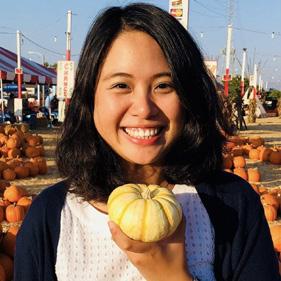
promise, as evidenced by research accomplishments as well as the quality of their advancement document.
This
35 Fall 2021
scientific
award defrays registration and travel costs for outstanding neuroscience graduate students to attend and present at the annual Winter Neurobiology of Learning and Memory Meeting at Park City, Utah.
This prize is awarded in memory of Roger W. Russell, who was a Lifetime Distinguished Fellow of the CNLM. The purpose of the award is to recognize individuals who emulate and demonstrate Roger Russell’s dedication to exacting scholarship in the conduct of research, personal attributes of integrity and collegiality, and steadfast support of the goals and programs of the CNLM.
Dr. Norman M. Weinberger was a founding UCI faculty member and a founding member at the CNLM. This award supports exceptional graduate students that embody Professor Weinberger’s high standards for doctoral trainees.
Jared M. Roberts Memorial Graduate Student Award Roger W. Russell Award in the Neurobiology of Learning and Memory
Tri Dong 2020 Morgan Coburn 2020
Amanda McQuade 2020
Sandra Gattas 2020 Sarah Kark 2020
Sophia Levis 2020
Brian Gomringer 2021 Keiland Cooper 2021
Yasmine Sherafat 2020
Cassie Kooiker 2021 Lily Cheng 2021
Alexandria Weaver 2021
Mitchell Farrell 2020
Negin Sattari Barabadi 2020
Rachael Elizabeth Hokenson 2020
Elizabeth Hubbard 2020
Andrew Chen 2021 Desiree Macchia 2021 Vinicius Duarte 2021
Sima Chokr 2021 Pin-Chun Chen 2021
Daniel Rindner 2021
Steven Granger 2021
Celebrating CNLM Trainees Setting a New Record High for Fellowship Funding
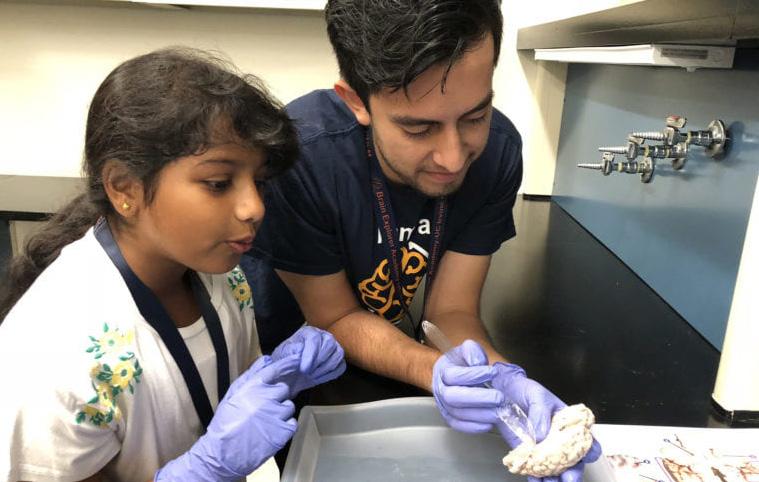

NIH
NRSA F30/31/32 Fellowships enhance the diversity of the health-related research workforce by supporting the research training of predoctoral students from population groups that have been shown to be underrepresented in the biomedical research workforce. The research training is expected to clearly enhance the individual’s potential to develop into a productive, independent


36 CNLM Report
National Research Service Scholar Fellows
National Science Foundation Graduate Fellows
research scientist.
The NSF Graduate Research Fellowship Program (GRFP) is a highly prestigious program that recognizes and supports outstanding graduate students in NSF-supported STEM disciplines. As the oldest graduate fellowship of its kind, the GRFP has a long history of selecting recipients who achieve high levels of success in their future academic and professional careers. Past fellows include numerous Nobel Prize winners, former U.S. Secretary of Energy, Steven Chu, Google founder, Sergey Brin and Freakonomics co-author, Steven Levitt.
Jenna Adams Yassa Lab Yasaman Alaghband Fowler Lab Wedad Alhassen Alachkar Lab Miguel Arreola Green Lab Ricardo Azevedo Gandhi Lab
Keiland Cooper Fortin Lab
Pieter Derdeyn Beier Lab Tri Dong Wood Lab
Dhruba Banerjee Gandhi Lab Rianne Campbell Wood Lab Miranda Chappel-Farley Yassa Lab Joshua Crapser Green Lab Kelli Dickerson Quas Lab
Freddie Marquez Yassa Lab Angeline Dukes Fowler Lab Rachel Smith-Peirce Jaeggi Lab
Mitchell Farrell Mahler Lab Dario Figueroa Velez Gandhi Lab Jan Frankowski Hunt Lab Gianna Fote Thompson Lab Sandra Gattas Yassa Lab
Jessica Noche Stark Lab
Julian Quintanilla Mahler Lab Alexandria Weaver Jaeggi Lab
Brenda Gutierrez Flanagan Lab Heechul Jun Igarashi Lab Ashley Keiser Wood Lab Sophia Levis Mahler Lab Yasmine Sherafat Fowler Lab
Elizabeth Spangenberg Green Lab
Forrest Weghorst Cramer Lab
NIH Institutional Training Grant Fellows
The purpose of NIH-supported T32 Training grant programs is to enable institutions to recruit individuals competitively selected by them for predoctoral and postdoctoral research training in specific areas of need. The goal of this program is to prepare qualified predoctoral and/ or postdoctoral trainees for careers that have a significant impact on the health-related research needs of the Nation.
Hewitt Foundation Postdoctoral Fellows
The Hewitt Foundation for Biomedical Research supports outstanding mentors and postdoctoral fellows. It aims to nurture the next generation of biomedical research leaders.

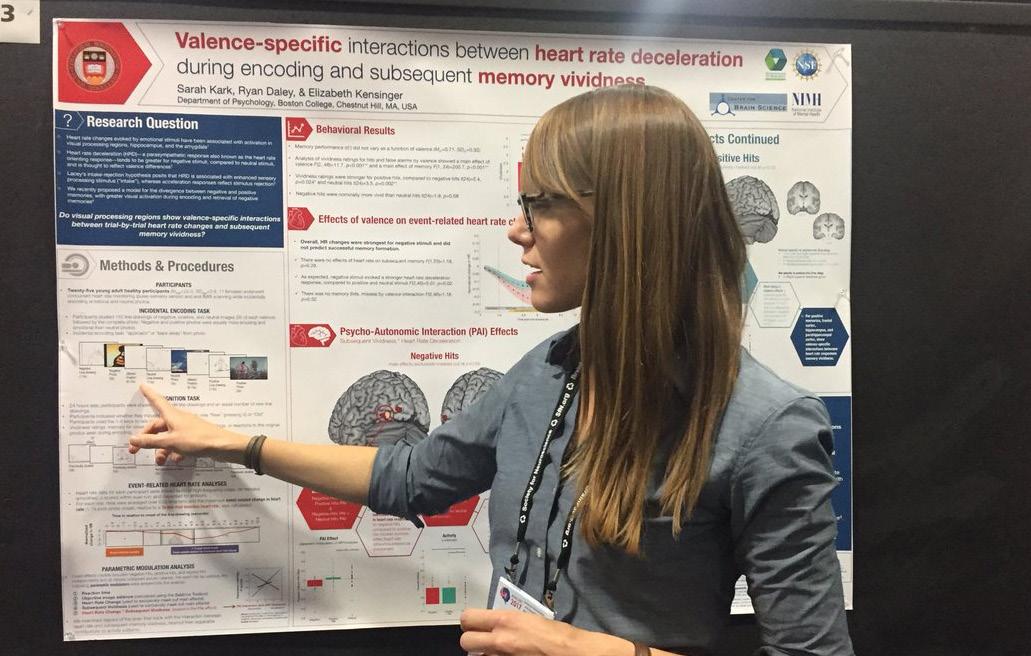

Neuroscience Training Grants at
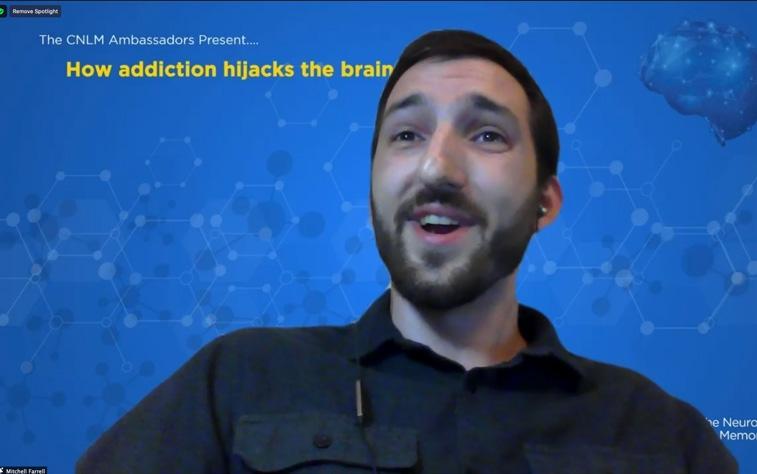
Predoctoral to Postdoctoral Transition Award (F99/K00)
The purpose of the F99/K00 is to encourage and retain outstanding graduate students who have demonstrated potential and interest in pursuing careers as independent researchers. The award will facilitate the transition into successful research postdoctoral appointments.
National Defense Science and Engineering Graduate Fellows
The DoD National Defense Science and Engineering Graduate (NDSEG) Fellowship Program is a competitive fellowship that is awarded to students who intend to pursue a doctoral degree aligned to the DoD and national security goals and priorities.
Ford Foundation Fellows

The Ford Foundation Fellowship Program seeks to increase the diversity of the nation’s college and university faculties by increasing their ethnic and racial diversity and maximize the educational benefits of diversity for enriching the education of all students.
This research may further our understanding of dementia, as these temporal memory regions are the first to experience age-related deficits and also show some of the first pathological hallmarks of Alzheimer’s disease, most
Jacky Au Jaeggi Lab
Katrina Bartas Beier Lab
Miranda Chappel-Farley Yassa Lab
Carlene Chin Wood Lab
Pieter Derdeyn Beier Lab
Matthew Birnie Baram Lab
Jessica Bolton Baram Lab
Mitchell Farrell Mahler Lab
Anjelica Cardenas Lotfipour Lab
Nora Harhen Bornstein Lab
Natalie DiProspero Yassa Lab Elena Dominguez Stark Lab
Vinicius Duarte Thompson-Peer Lab
Angeline Dukes Fowler Lab
Mitchell Farrell Mahler Lab
Jessica Childs Wood Lab Sarah Kark Yassa Lab
Sandra Gattas Yassa Lab
Steve Granger Yassa Lab
Rachel Hokenson Baram Lab
Cassandra Kooiker Baram Lab
Aliza Le Gall/Lynch Labs
Bianca Leonard Yassa Lab
Sophia Levis Baram/Mahler Labs
Michelle Ren Lotfipour Lab Daniel Rindner Lur Lab
37 Fall 2021
Jake Rounds Wood Lab
10
UCI
The Next Generation of Neuroscientists

“Even beyond the competition, the event offers such exciting activities, lectures, demos, and the opportunity to learn about science careers and university life from UCI undergraduates, graduates, staff, postdocs, and faculty. The Brain Bee is open for everyone to have fun!”


The Irvine Brain Bee Buzz


Each year, the CNLM hosts the Irvine Brain Bee to inspire high school students in Orange County to learn about the brain and provide opportunities for engagement with university students and professors. The winner of the Irvine Brain Bee goes on to participate in the USA National Brain Bee.


Congratulations, Nicholas!
Find out more at: https://cnlm.uci.edu/brain-bee-buzz
The CNLM was selected to be the home of the U.S. National Brain Bee in 2023, which will be held in conjunction with the Center’s International Conference on Learning and Memory in 2023 (#LEARNMEM2023).
 2020 Irvine Brain Bee winner Nicholas D’Sa placed 6th in the USA National Brain Bee Championship where he competed with 67 other high schoolers from around the country.
2020 Irvine Brain Bee winner Nicholas D’Sa placed 6th in the USA National Brain Bee Championship where he competed with 67 other high schoolers from around the country.
39 Fall 2021
- Rachael Hokenson Brain Bee Chair
The Next Generation of Neuroscientists

Budding Neuroscientist Mobilizes High School Community
SCYNA hosted a NeuroArt Competition, a national contest that encouraged students to integrate science with art.

In partnership with the CNLM, Nikhita Kaushik, a sophomore at Irvine’s Arnold O. Beckman High School, launched the SoCal Youth Neuroscience Association (SCYNA), a 100 member Orange County organization for high school students. Led by its Board of Directors, the group hosts monthly events to engage high schoolers in neuroscience.
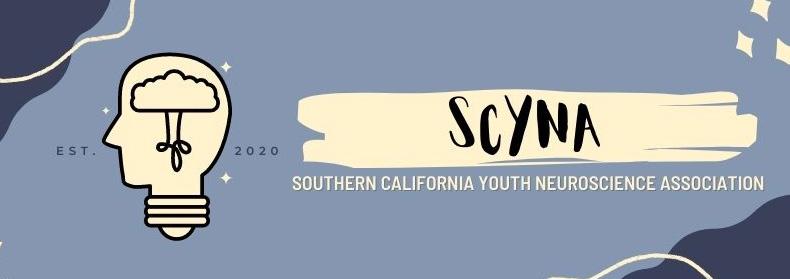

To learn more about SCYNA, visit: https://cnlm.uci.edu/scyna/
“There are so many things that are unknown about the brain, so the huge scope of things that you can research and learn about is very exciting. I’m a pretty curious girl. I sometimes ask way too many questions, and in neuroscience there’s a lot of room for that.”
 - Nikhita Kaushik SCYNA Founder and President
- Nikhita Kaushik SCYNA Founder and President
40 CNLM Report
There is tremendous value in using neuroscience to attract students to careers in STEM. Having the opportunity to build relationships with real scientists and be part of the discovery process can make a lasting impact on the lives of children and adolescents.
When Life Gives You Lemons... Give Away Lemonade!
The 2020 UCI Giving Day came at a time when our community was hurting and in need of healing from the COVID-19 pandemic. Thirty CNLM Ambassadors (UCI neuroscience students and trainees) gave back by hosting a virtual neuroscience journal club. More than 60 high school students from around the country participated in this eight week program. In addition to learning how to critically read scholarly journal articles, the students also engaged in discussions about the history of neuroscience, methods in neuroscience research, college life and careers in neuroscience. The goal of the program was to engage a diverse group of teens in neuroscience thus contributing to informed citizenry.
By offering high school students tools for scientific critical thinking we hope to prepare them for successful and productive futures and careers.
What was your favorite part of the virtual journal club?

?Interacting with the mentors! The mentors have good insight of what the field is all about. I am very grateful in taking part in the program.
Being able to interact with actual college students!
Learning about everything a researcher does and all the different educational routes I can take to help me become involved in neuroscience!
Find out more: https://cnlm.uci.edu/2020-give-back
“UCI’s junior neuroscientists came together in a big way over the summer to teach high school students skills they don’t typically learn until they are working in a university research laboratory.”
- Manuella Oliveira
Yassa Director of Outreach and Education
UCI Giving Day 2020
CNLM Junior Neuroscientists Give Back to High School Students
41 Fall 2021
The Next Generation of Neuroscientists
UCI Brain Camp Lays the Groundwork for Success in Neuroscience



UCI Brain Camp is an immersive two-week summer neuroscience camp for middle and high school students. Brain Campers engage in seminars, workshops, laboratory tours, dissections, hands-on experiments with UCI neuroscience students and faculty. As one of only a handful of summer K-12 neuroscience programs in the country, UCI Brain Camp offers a unique opportunity for meaningful, hands-on participation in neuroscience.
“I wanted to thank you for the amazing time that I had at Brain Camp this year! I loved all of the lectures, especially Dr. Steve Mahler’s lecture on addiction and Dr. Yassa’s talk on how an MRI functions! All of these inspiring professors have reinforced my determination to pursue a path in neuroscience! Everyone at the camp was so friendly and welcoming and I have definitely made some friends for life! I hope to come back to UCI next summer and be able to participate in research!”
– 11th Grade Brain Camp Student.
Find out more: https://cnlm.uci.edu/braincamp
“I really enjoyed learning about the new advancements being made in this field and learning from the grad students.” - 2019 Brain Camp Participant

42 CNLM Report
“There is an immense potential for making a difference in the lives of children in the rural, disadvantaged parts of our country. Programs like this open their eyes to the possibility of a college education and a career in STEM fields.”
- Jonathan Hasselmann Brain Explorer Academy Co-Chair
Brain Explorer Academy Expands Young Minds

Manuella O. Yassa
received the “Great Partners” Award in 2019 from UCI’s Engage Initiative for her work building meaningful partnerships with the community. The Brain Explorer Academy is one of the flagship programs Yassa has developed to create meaningful and rich experiences for local youth.
The Brain Explorer Academy is a first-of-its-kind science mentorship experience for second to fifth grade students. It was developed with the idea that a true science foundation can
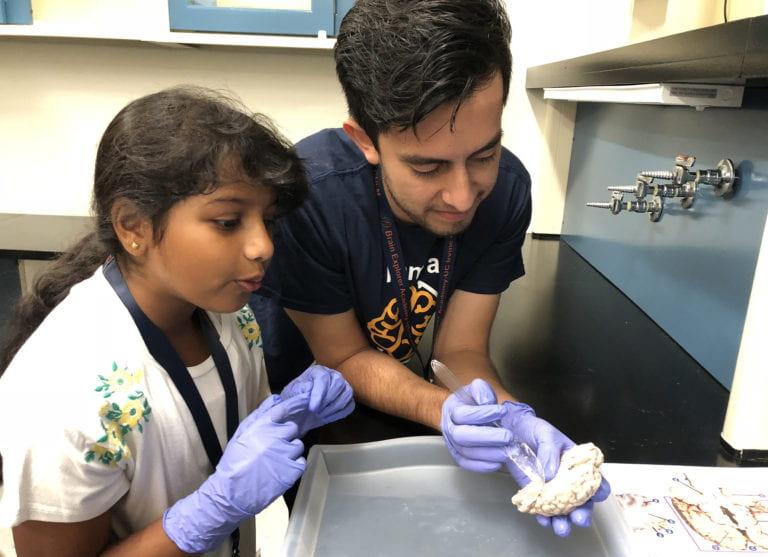
only be developed through a multi-week, hands-on, immersive program, during which science mentors can build relationships with students and foster their growth as aspiring scientists.
Find out more: https://cnlm.uci.edu/brain-explorer
The Brain Explorer Academy is offered at no cost to participants and is entirely funded by community philanthropy. To contribute, please contact manuella.yassa@uci.edu.
“Our young explorers are exposed to a whole new way of thinking. We want them to ask what-ifs and then go and investigate. Thinking like a scientist is a skill that will help them in whatever career they choose.”
 - Manuella Oliveira Yassa Director of Outreach and Education
- Manuella Oliveira Yassa Director of Outreach and Education
43 Fall 2021
Community Impact
The Seven Sins of Memory
McGaugh-Gerard Lecture Speaker Professor Daniel L. Schacter describes the “Seven Sins of Memory” to a packed house at the Irvine Barclay Theatre.

The McGaugh-Gerard Lectures on Learning and Memory are made possible by the McGaugh-Gerard Endowment that was established by Dr. James L. McGaugh and the family trust of the late Dr. Ralph W. Gerard. Drs. McGaugh and Gerard were friends and colleagues who shared a mutual respect for one another as well as for their research in neuroscience.
Renowned memory expert Dr. Daniel L Schacter discussed how memory “mistakes” are due to an otherwise adaptive brain and how our memory system is wired to imagine our future.
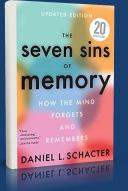
Dr. Gerard arrived at UC Irvine in 1964 and helped founding Chancellor Daniel G. Aldrich, Jr. organize the new campus. He was appointed the first Dean of the Graduate Division. Dr. McGaugh also arrived at UCI in 1964 and was interviewed by Dr. Gerard for the position of founding chair of Psychobiology, which is now known as the Department of Neurobiology and Behavior.
Find out more: https://cnlm.uci.edu/schacter


Schacter recently updated his 1992 classic into a new gripping and thought-provoking treatment of memory miscues that occur in everyday life, placing them into seven categories: absent-mindedness, transience, blocking, misattribution, suggestibility, bias, and persistence. He illustrates these concepts with vivid case studies, literary excerpts, experimental evidence, and accounts of highly visible news events. The new book was a New York Times Notable Book
- Daniel Schacter Professor of Psychology, Harvard University
“We as humans inherently use past scenarios to imagine possible future scenarios by taking flexible pieces of the past and combining them to create novel ideas for the future.”
44 CNLM Report
“Working in the California Legislature allows me to use the analytical, communication, and people skills that I honed during my PhD, to help people. My research skills help me to evaluate the effects that policy changes might have, and to understand complex issues and statutes. I use my communication skills constantly, since I have to explain bills to legislators, staff, and constituents all the time. My job is extremely rewarding, and my training as a neuroscientist gave me the skills to succeed.”
A Lesson in Communicating Science
Maria Montchal was one of 12 graduate students and postdoctoral researchers to be invited to the California State Capitol to communicate their research to decision makers. Montchal, who has attained her PhD, completed a fellowship with the California Council on Science and Technology and is now a legislative aide working with CA State Assemblymember 25th District Alex Lee.

Find out more: https://cnlm.uci.edu/montchal
“Opening the lines of communication between California’s researchers and policymakers can only help to ensure the bright future of California.”

 - Jose Medina
- Jose Medina
45 Fall 2021
California State Assemblymember
- Maria Montchal
Legislative Aide, California State Assembly
Community Impact
How Do You Want to Experience Your Universe?
The Distinguished Lecture Series on Brain, Learning and Memory founded in 1995, is an integral part of the CNLM’s outreach mission. Lectures are free and are intended for a lay audience. Attendees are provided with ample opportunity to interact with and ask questions of the speakers.

In January 2019, neuroscientist and New York Times best-selling author Dr. David Eagleman delivered the 25th Annual Distinguished Lecture on Brain, Learning, and Memory at the Irvine Barclay Theatre. Eagleman is well-known for his research on brain plasticity, time perception and synesthesia as well as his numerous books.


Eagleman posed the tantalizing question of whether we can expand the realm of information we can perceive. In his words, “can we create new senses for humans?” He concluded that there is limitless potential for what we can sense.
Find out more: https://cnlm.uci.edu/eagleman

“There are 100 billion neurons in the human brain. And each one of these is sending tens or hundreds of electrical pulses to thousands of other neurons every second of your life. And somehow, all of this activity produces your sense of reality.”
- David Eagleman Neuroscientist, Stanford University
46 CNLM Report
Conscience: The Origins of Moral Intuition
 - Patricia Churchland Professor Emerita of Philosophy, UC San Diego
- Patricia Churchland Professor Emerita of Philosophy, UC San Diego
Neurophilosopher Dr. Patricia Churchland gave the 26th Annual Distinguished Lecture on Brain, Learning and Memory at the Irvine Barclay Theatre. Her talk, Conscience: The Origins of Moral Intuition, explored the most recent advances in reconciling the bridge between the philosophical nature of morality and ties with modern neurobiology.

In 1975, American biologist E. O. Wilson said that the “evolution of human sociality is the fundamental conundrum of biology.” Churchland’s talk discussed the evolutionary basis and biological underpinnings of moral intuition, a discussion featured in her new book.

Find out more: https://cnlm.uci.edu/churchland
Churchland’s new book explains the biological underpinnings of morality and conscience. She highlights the animals that also demonstrate moral intuition such as the prairie voles who exhibit a strong pattern of pair bonding where the male and female are together for life.

47 Fall 2021
“The value of survival and well-being is built into the very structure of the nervous system.”
Community Impact
Sleep to Feel, to Think, and to Remember
sleep even when they get older. Sleep problems can be fixed but first need to be diagnosed by a specialist.
Chen shared sleep hygiene tips: set up sleep routines, get sufficient bright light exposure, engage in phyical activity, and avoid late night caffeine or alcohol. Most importantly, keep a consistent schedule in sleep and activity.
In April 2021, the CNLM Ambassadors hosted a virtual panel discussion with three UCI sleep experts. These experts, Dr. Bryce Mander, Dr. Ivy Chen and PhD student Frida Corona, shared stories of how they got into sleep research and provided advice on how to improve and better understand our sleep. Mander discussed how sleep efficiency matters more than how many hours we sleep. He shared that people can continue to have good
Find out more: https://cnlm.uci.edu/sleep-panel



Finally, Corona shared that sometimes our environment can be a source of stress but social contact could buffer the stress. As for what to do when you can’t fall asleep, it’s best to get up and do something for 15-20 minutes so that your brain doesn’t associate being in bed with being awake Meditation helps!
Tips for Healthy Sleep
• Maintain a regular sleep schedule • Use a calming bedtime routine • Limit light exposure in the evening • Eliminate screen time in bed • Make your bedroom comfortable
Avoid caffeine too close to bedtime
48 CNLM Report
We spend nearly one third of our lives asleep. Despite its universal nature and apparent necessity, why we sleep remains largely a mystery.
•
“The panel was fantastic. I was mesmerized by the speakers and what they had to say. So much information back and forth from speakers who are at the top of their game. What a privilege to participate in that Q&A. Although I live only about five miles from UCI, I would be totally cut off from all the exciting things going on on campus if it were not for the CNLM.”
Virtual Evenings to Remember
In 2020/21 we featured our most recently inducted Fellows in a brand new virtual format.



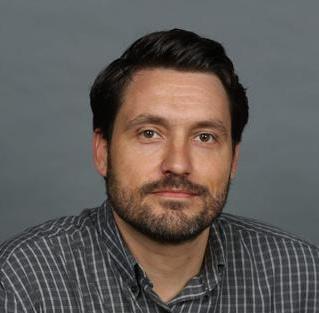




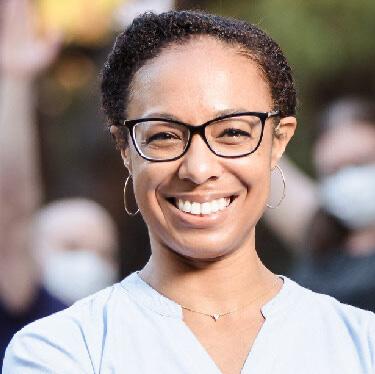



Big Idea Talks Panel Discussions Making Memory Stronger Origins of Motivation




How Memories Are Made
The goal of this series was to re-create in a virtual setting the charm of the traditional Evenings to Remember: an intimate atmosphere, exciting new research, and opportunities to dialogue with researchers passionate about their field.
 Aaron Bornstein
Kevin Beier
Gyorgy Lur
Kei Igarashi
Lulu Chen
Elizabeth Martin
Bryce Mander
Katherine Thompson-Peer
Autumn Ivy
Autumn Ivy
Sean Ostlund
Arielle Tambini
Liz Chrastil
Robert Hunt
- Marsha Swartz Friend of the CNLM
Aaron Bornstein
Kevin Beier
Gyorgy Lur
Kei Igarashi
Lulu Chen
Elizabeth Martin
Bryce Mander
Katherine Thompson-Peer
Autumn Ivy
Autumn Ivy
Sean Ostlund
Arielle Tambini
Liz Chrastil
Robert Hunt
- Marsha Swartz Friend of the CNLM
In Memoriam
James T. Goodrich, M.D., Ph.D.

The CNLM family was heartbroken to hear that a dear colleague and friend, Dr. James T. Goodrich, passed away in 2020 from complications from COVID-19. Dr. Goodrich was a pioneer in helping children with complex neurological conditions. He developed an approach for separating conjoined twins who were fused at the brain and skull and captured our hearts when he led a team of forty doctors in successfully separating conjoined twins Anias and Jadon who were 13 months old.

Dr. Goodrich and his wife Judy have been integral members of the CNLM community and together they established the James Tait Goodrich Award for Excellence in Neurobiology in Honor of James McGaugh award. This prestigious award recognizes third year School of Biological Sciences undergraduate students for outstanding achievement in neurobiology and is given out at the annual CNLM Young Scholar Award Ceremony. The recipient receives a $1,000 award to help advance their scholarship and research.
Find out more: https://cnlm.uci.edu/jamesgoodrich
“This award has allowed me to continue my research throughout my undergraduate education and participate in publications and further studies. It’s an honor and I hope to one day be even half the surgeon and scholar Dr. Goodrich was.”
- Sonya Parievsky
2019 James Tait Goodrich Award recipient
50 CNLM Report
“Ivan was one of my closest friends. I met him in Argentina in the early 70’s when I was collaborating on research with his father. We went to a great many meetings together, in many countries, he came to my laboratory for research, we wrote articles and reviews together and we visited each other’s homes. In recent years we exchanged emails on a regular basis.”
- James L McGaugh
Distinguished Professor Emeritus and Founding Director of the CNLM
Ivan Izquierdo, Ph.D.
We were deeply saddened to learn of the passing of distinguished CNLM Fellow Dr. Ivan Izquierdo. He was a renowned Argentine Brazilian scientist and recognized as a pioneer in the learning and memory community.

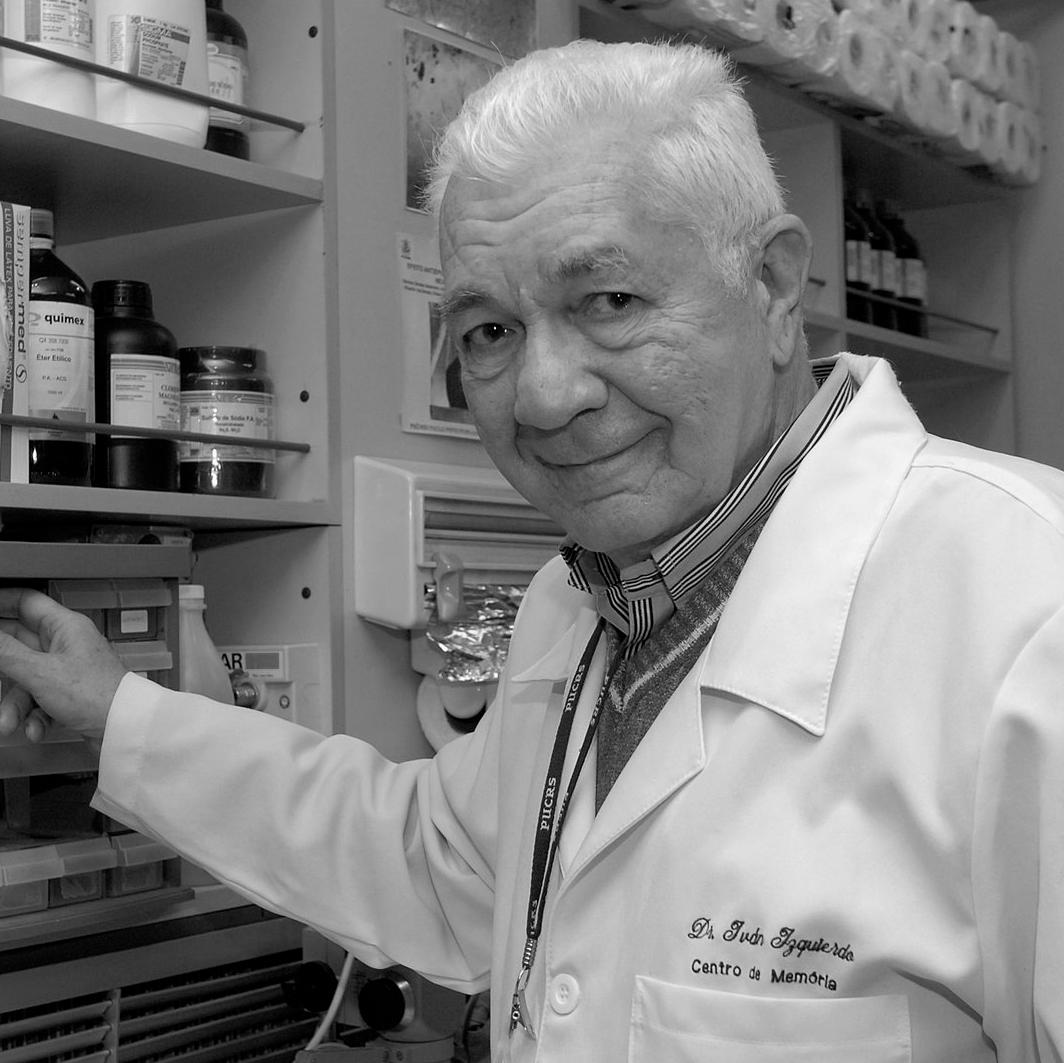
Dr. Izquierdo made numerous key contributions to our understanding of the cellular processes of memory storage and retrieval. He was among the first to reveal the roles of epinephrine, dopamine, endogenous opioid peptides and acetylcholine in modulating memory consolidation and state-dependent memory retrieval. Some of his achievements include advancing our understanding of the molecular bases of memory formation, retrieval, persistence and extinction in the mammalian brain, and the functional discrimination between short and long-term memory.
Find out more: https://cnlm.uci.edu/ivan-izquierdo
John C. Herklotz
The CNLM family mourned the loss of John C. Herklotz, a film producer, businessman, philanthropist and avid local supporter of the Center. The name Herklotz is a staple at the CNLM. Mr Herklotz established the Dale Melbourne Herklotz Conference room in honor of his wife, a Hollywood stage actress, after she passed in 1998 from Alzheimer’s disease.
Not only was Herkltoz committed to perpetuating the memory of his wife, he was committed to expanding lab space at UC Irvine to continue our understanding of the brain.
Find out more: https://cnlm.uci.edu/john-herklotz
“John was one of our biggest supporters. His family name and legacy are intricately tied to the history and success of the CNLM. He will be deeply missed.”
- Michael A. Yassa Director
51 Fall 2021
Building a Legacy: Campaign for the Future

Memory is the sum of who we are. It takes a fleeting moment in our experience and allows it to last indefinitely. It stretches our consciousness over a lifetime and allows us to enjoy meaningful and fulfilling lives. It enables us to project ourselves into the future, imagining what is yet to come. It chronicles the history of our species and will tell our tale long after we are gone. Simply put, without memory, humanity could not exist. Yet, for something so essential and ubiquitous, we are still learning how it works. Join us on our quest to reveal memory’s remaining secrets!
Generosity Supporting the Extraordinary

How are memories formed? How do they last? How do they come back?
We have learned so much, yet countless mysteries about memory and the brain are still waiting to be solved.
Our discoveries at the CNLM can transform the future and catapult humanity to new frontiers in technology, education, and medicine.
Partner with us and the next transformative discovery is just on the horizon.
The Friends of the CNLM are a community of like-minded individuals who generously support and sustain the CNLM’s most pressing research and education priorities through commitments to annual giving. Friends are invited to enjoy special lectures and engagements on campus.


If you would like to explore the possibility of joining the Friends of the CNLM, please let us know and we can provide opportunities to explore what the CNLM has to offer.
To inquire about CNLM gifts and giving please contact:
Jennifer
Smith Executive Director of Development

Email: jennifer.smith@uci.edu
Learn More at: https://cnlm.uci.edu/gifts

53 Fall 2021
American Academy of Neurology Michele and Richard Africano
Archarios Foundation Candace Bichsel Alex Cable Valerie Cantwell Children’s Hospital Boston Patricia and Larry Colando Laura Colgin Patricia and Frank Conner Dana Foundation, Inc. Marischal De Armond Philip Friedel Michael Friedlander Gordon and Rose Mcalpine Foundation for Neuroscience Research Matthias Haury International Brain Research Organization Arvind Kaushik and Padma Haran Johnson & Johnson Foundation Kennedy Krieger Institute Farah Lubin
Max Planck Florida Institute for Neuroscience Kelsea Magaraci Leigh and Richard Nelson Raymond Nuber
OpenBCI Conor Russomanno
Judith Stepan-Norris and Rick Norris
Tucker-Davis Technologies
Union of Concerned Scientists, Inc.
Verizon Foundation
David Walsh
Ernest Wright
Yale University
Michael and Manuella Yassa
Rosalind and Gary Ziccardi
$500 - $999
Elaine and James Alexiou
Ed Boyden
Barry Barnhill and Michael Burgess
British Neuroscience Association
Virginia Carson Cell Press
Anne Cooke
The France Family Trust
Michael Fox
John and Carolyn Garrett
Glen and Marcia Griffith
Jewish Community Foundation of Orange County
Amanda Naples
Kenneth and Peggy Pao
Carol and Clifford Ranney
David and Rebecca Ruhm
Georgia Rogers
Robert and Jo Anne Simon
Diane O’Dowd and Martin Smith
Joan Stratton
TCI Innovations
Andrea Tenner and Thomas Poulos
Richard and Lore Thompson
Sandra and Jay Wilbur
Stanford University School of Medicine
Robert Stone and Charlotte Bischel
Marsha Swartz
Virginia Tech School of Neuroscience Read
Thank You to Our Donors
is grateful for all our donors. The list of acknowledgments below includes all gifts received between January
2019 and November 15,
Donors are listed in alphabetical order within category. $1,000,000+ Kathleen Burke* $100,000 - $999,999 John C. Herklotz* Diane and
Suzanne Turner $25,000 - $99,999 James
and Rosalyn Laudati Michael
$10,000 - $24,999 The Allergan Foundation Facebook Jane
$5,000 - $9,999 Anonymous Anonymous D’Arcy
$1000 - $4,999
The CNLM
1,
2021.
Igal Silber Charles and
Pick
Oldmen
Woods
Bolton Communication Disorders Research Foundation Dennis and Diane Baker Lawrence and Sharlene Goodman Renee Harwick Howard Hughes Medical Institute Massachusetts Institute of Technology Thomas Nielsen Allison Soung Stanford ADVANCE Institute Stanford University Thomas and Marilyn Sutton Vanguard Charitable
Anonymous
CNLM Report 54
a
at:
our Case Statement at: https://cnlm.uci.edu/gifts
Make
Gift Online
https://cnlm.uci.edu/gifts
Community philanthropy is vital to our mission to pursue a complete understanding of the brain mechanisms that underlie learning and memory and to use this knowledge to positively impact our communities. We rely on the generosity and partnership of our donors to invest in high-risk high-reward research, to recruit and train the nation’s top neuroscience talent, to equip research labs with the most cutting-edge transformative technologies, and to make the study of the brain possible for everyone.

Peggy and John Bunnell
Chris Calderon
Elena Chartoff
Jimmie Covington
Neel Dhruv
Leo Cummins
David Fishlock
Vittorio Gallo
Edith Gibson
Andrew Goldman
Susan Groff
Barbara Hamkalo
Daniel Hardy
Seth Hepner
Sandra and Steven Horowitz
Ben Huang
Nancy Kidder
Brock and Maren Kirwan
John and Fritzia LaRue
Christopher Lay Ruth Leonard
Goran Matijasevic
Christine and Frederick Meister
Dean and Patti Ranger
Katharine and Jack Schoellerman
Julie Siegenthaler
Nathan Smith
Gary and Mary Spencer
Betty Solloway
Susan Staub
Emily Sylwestrak
Judith Thompson
James and Natalie Vogt Tamara Weinberger
Theodore Yanagihara
$10 - $99
Alejandro Alvarez
Ann and Lee Baerny
Kenneth and Shari Charlton
Charlton Financial Planning
Ada Clark
Noori Chai
Robert and Liz Duffield Gilbert Gonzalez and
Ashok
Donald Hansen
Adeleh Hashemi
Arlene Hirano
Carole Hollrigel
Rachael Hokenson
Rhianna Hopkins
Jenna Jablonski
Raymond and Laya Kesner
Sandhya Kona
Diana Lofflin
Maria Marano
Adayla Michalowicz
Hollis Rhodes
Katayoon Setodehnia
Sister STEM LLC

Daniel Stornetta
Gwen van der Wijk
Ivan and Erika Williams
Melody Wu * deceased
$100-$499
Michael and Millie Maloney Shirley and Norman Pruitt
55 Fall 2021
Frances Leslie Paul Gray
Susan Green
Gupta
Read our Case Statement online and discover our funding priorities for UCI’s $2B Brilliant Future Campaign https://cnlm.uci.edu/gifts
A Brilliant Future Together
CNLM Funding Priorities
Wired for Innovation
We know exactly how to speed up the pace of scientific discovery by creating unique interdisciplinary collaborations that quickly move ideas from concept to reality. We need your help to keep us at the leading edge of innovation by investing in extraordinary people and technologies. With your generous help, we will strategically recruit world-class scientists, build new leading-edge core facilities, and catalyze high-risk high-reward research.
Wired for the Future
We are a globally renowned hub for developing exceptional scientists and innovators. Exciting opportunities have recently emerged in research and industry and there is an urgent need for a diverse workforce with cutting-edge training and unique skill sets. With your help we can amplify our education efforts beyond the traditional classroom setting to prepare our best trainees for current and future opportunities.

Wired for Orange County
We partner with our community to create opportunities to experience world-class research and share in the discovery process. Orange County is home to a thriving economy and some of the most creative minds in the world. We strive to create a joint community centered around the thrill of discovery in brain science. With your support, we will expand our flagship Brain Explorer Academy, grow our public lecture series, and build a new industry partnership program.

The CNLM is featured in UCI’s $2B Brilliant Future Campaign. Read our Case for Support at https://cnlm.uci.edu/gifts

CNLM Report 56
THANKS A BILLION.
Thanks to the generous support of our alumni and friends, BRILLIANT FUTURE: The Campaign for UCI
is now more than halfway to our goal. Thanks to you, we’ve poured over $1 billion into world-changing
medical and scientific research, created new scholarships so students from all backgrounds have access to world-class education and increased programs to benefit O.C. communities.
Every gift makes a difference.
Together, we are creating a brilliant future for all.
To learn more about how your support is helping us change the world, please visit m.uci.edu/brilliant-impact




Connect with us (949) 824-5193 cnlm.uci.edu



























 - Aaron Bornstein
Organizing Committee Co-Chair
- Aaron Bornstein
Organizing Committee Co-Chair












































 - Maria Montchal Lead Study Author
- Maria Montchal Lead Study Author






 - Carey Huh Lead Study Author
- Carey Huh Lead Study Author









































 Desiree Macchia K-12 Committee Co-Chair
Jonathan Hasselmann Brain Explorer Academy Co-Chair
Hamsi Radhakrishnan K-12 Committee Co-Chair Miranda Chappel-Farley Adult Program Co-Chair
Steve Granger Communications Committee Co-Chair
Caden Henningfield Brain Bee Co-Chair
Manuella Oliveira Yassa Program Director
Lily Cheng Adult Program Co-Chair
Aby Flores Communications Committee Co-Chair
Andra Ionescu Professional Development Chair
Jessica Noche Lingad Program Co-Chair
Morgan Coburn Brain Explorer Academy Co-Chair
Rachael Hokenson Brain Bee Co-Chair
Keiland Cooper Outcomes Committee Co-Chair
Olivia Bernstein Outcomes Committee Co-Chair
Desiree Macchia K-12 Committee Co-Chair
Jonathan Hasselmann Brain Explorer Academy Co-Chair
Hamsi Radhakrishnan K-12 Committee Co-Chair Miranda Chappel-Farley Adult Program Co-Chair
Steve Granger Communications Committee Co-Chair
Caden Henningfield Brain Bee Co-Chair
Manuella Oliveira Yassa Program Director
Lily Cheng Adult Program Co-Chair
Aby Flores Communications Committee Co-Chair
Andra Ionescu Professional Development Chair
Jessica Noche Lingad Program Co-Chair
Morgan Coburn Brain Explorer Academy Co-Chair
Rachael Hokenson Brain Bee Co-Chair
Keiland Cooper Outcomes Committee Co-Chair
Olivia Bernstein Outcomes Committee Co-Chair































































 2020 Irvine Brain Bee winner Nicholas D’Sa placed 6th in the USA National Brain Bee Championship where he competed with 67 other high schoolers from around the country.
2020 Irvine Brain Bee winner Nicholas D’Sa placed 6th in the USA National Brain Bee Championship where he competed with 67 other high schoolers from around the country.




 - Nikhita Kaushik SCYNA Founder and President
- Nikhita Kaushik SCYNA Founder and President







 - Manuella Oliveira Yassa Director of Outreach and Education
- Manuella Oliveira Yassa Director of Outreach and Education






 - Jose Medina
- Jose Medina



 - Patricia Churchland Professor Emerita of Philosophy, UC San Diego
- Patricia Churchland Professor Emerita of Philosophy, UC San Diego





















 Aaron Bornstein
Kevin Beier
Gyorgy Lur
Kei Igarashi
Lulu Chen
Elizabeth Martin
Bryce Mander
Katherine Thompson-Peer
Autumn Ivy
Autumn Ivy
Sean Ostlund
Arielle Tambini
Liz Chrastil
Robert Hunt
- Marsha Swartz Friend of the CNLM
Aaron Bornstein
Kevin Beier
Gyorgy Lur
Kei Igarashi
Lulu Chen
Elizabeth Martin
Bryce Mander
Katherine Thompson-Peer
Autumn Ivy
Autumn Ivy
Sean Ostlund
Arielle Tambini
Liz Chrastil
Robert Hunt
- Marsha Swartz Friend of the CNLM


















